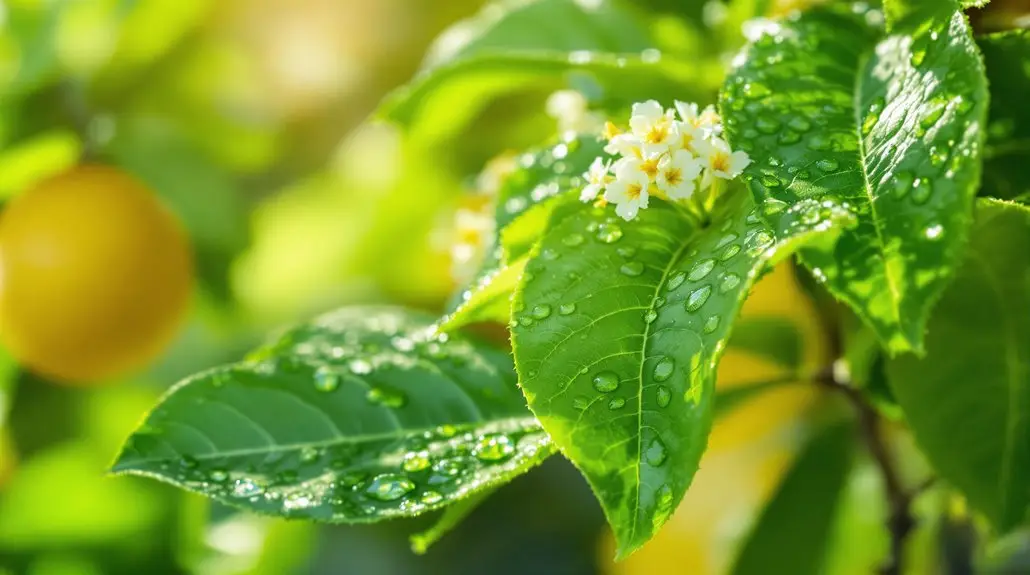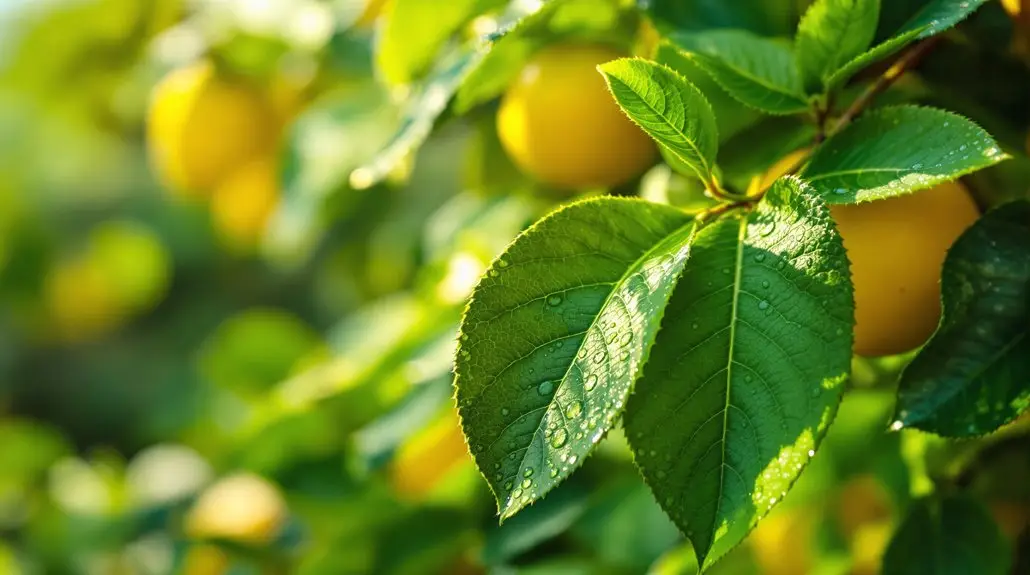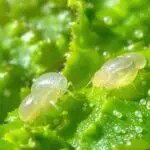Bergamot, or Citrus bigaradia, offers a fascinating pesticidal composition that makes it an effective natural pest control option. Its essential oil, rich in compounds like limonene and linalyl acetate, works as a mild insect repellent, targeting pests like mosquitoes and flies. This oil's pleasant aroma also suffocates insects while being harmless for beneficial species and aquatic life, making it an ideal choice for organic pest management. Additionally, its bioactive flavonoids enhance its efficacy. You'll discover even more about the diverse benefits and applications of bergamot in pest control as you explore deeper insights.
Key Insights
- Bergamot essential oil contains compounds like limonene and linalyl acetate, which exhibit anti-inflammatory and antioxidant properties beneficial for pest management.
- Flavonoids such as neoeriocitrin and naringin in bergamot oil serve as mild insect repellents, effectively deterring mosquitoes and flies.
- The non-toxic nature of bergamot oil makes it a safe alternative to traditional pesticides, minimizing harm to beneficial insects and aquatic life.
- Bergamot is recognized as a biopesticide by the EPA, aligning with safety standards for organic farming and pest control practices.
- The Bergamot Polyphenolic Fraction may reduce the toxic effects of conventional pesticides on pollinators, supporting ecosystem health and sustainability.
Phytochemical Profile of Bergamot

The phytochemical profile of bergamot reveals a rich tapestry of bioactive compounds that contribute to its health benefits. You'll find that bergamot juice is packed with flavonoids, including neohesperidin, hesperetin, neoeriocitrin, and naringenin. These compounds not only add to the flavor but also offer significant health advantages. For instance, bergapten and citropten can inhibit IL-8 expression, which is essential for managing inflammation.
Different cultivars like Castagnaro, Fantastico, and Femminello showcase varying total flavonoid content, ranging from 0.19 to 0.34 mg/mL. When it comes to antimicrobial properties, eriodictyol stands out, showing effectiveness against Gram-negative bacteria. Notably, the antimicrobial activity of flavonoids increases with enzymatic deglycosylation, enhancing their potential. Recent studies have also identified 39 components within bergamot's polyphenolic fraction, further underscoring its complexity. Furthermore, the presence of unique flavonoids in bergamot peel distinguishes it from other citrus fruits and highlights its potential for economic processing.
Bergamot's polyphenolic fraction is equally impressive, containing compounds like flavanones, limonoids, and phenolic acids such as gallic and caffeic acids. These polyphenols exhibit antioxidant activity, which contributes to overall health and may even play a role in treating metabolic syndrome.
As you explore the benefits of bergamot, recognize its antioxidant capacity, measured through various assays. The juice's vitamin C content and its specific pH range—from 2.77 to 2.84—help maintain the stability of these compounds.
Understanding bergamot's phytochemical profile not only connects you to its health benefits but also deepens your appreciation for this remarkable fruit.
Essential Oil Characteristics
Bergamot's phytochemical richness extends beyond its juice to its essential oil, which boasts a unique composition that contributes to its diverse benefits. You'll find that the main chemical constituents of this oil—like limonene, linalyl acetate, linalool, pinene, and terpineol—combine to create a powerhouse of therapeutic properties.
Limonene acts as an antioxidant and appetite suppressant, while linalyl acetate helps ease inflammation and pain. Linalool offers calming effects, making it perfect for those stressful days. Pinene and terpineol add anti-inflammatory and antimicrobial benefits, enhancing the oil's overall efficacy. Additionally, the oil is obtained through steam distillation, providing a method that retains the essential properties of the plant.
The extraction of Bergamot essential oil primarily involves cold expression from nearly ripe fruit peels. This traditional method, now often mechanized, yields about 3 ounces of oil from 100 fruits, showcasing a beautiful color that can range from light yellow to dark green. Approximately 80% of the global production of Bergamot Essential Oil comes from Calabria, Italy, highlighting its significance in the market.
When it comes to the aromatic profile, the scent is fresh, sweet, and citrusy with a spicy undertone, creating an inviting atmosphere. This makes it a popular choice for natural perfumes, air fresheners, and homemade cosmetics.
You'll appreciate its uplifting qualities that can lift your mood and relieve feelings of lethargy or nervousness. Incorporating Bergamot essential oil into your daily routine can foster a sense of well-being, connecting you to nature and the soothing power it offers.
Embrace this fragrant oil and let its myriad benefits enhance your life.
Pesticidal Properties and Applications

When you think about pest control, bergamot mightn't be the first option that comes to mind, but its pesticidal properties are worth noting. The unique chemical composition of bergamot includes flavonoids like neoeriocitrin, naringin, and bergamottin, which contribute to its effectiveness as a mild insect repellent.
You'll find that bergamot oil, extracted from the rinds of unripe bergamot oranges, can help keep pests like mosquitoes and flies at bay in both residential and public spaces. This is particularly noteworthy as Citrus bergamia is primarily cultivated in southern Italy, showcasing its cultural significance in pest management.
The way bergamot oil works is fascinating. Its pleasant aroma not only repels insects but also suffocates them, making it a non-toxic alternative to traditional pesticides. Organic options like bergamot are increasingly sought after for their reduced toxicity to beneficial insects and aquatic life.
You'll appreciate that using bergamot in pest control doesn't compromise your environment or health. Combinations of bergamot compounds with other substances can enhance their efficacy, offering you a natural solution to pest issues.
Additionally, bergamot contains essential vitamins and minerals that can boost your overall well-being, creating a sense of belonging to a healthier lifestyle.
While early research on citrus disinfectants showed mixed results, the potential of bergamot in pest management is promising. Its antioxidant and antimicrobial properties can contribute positively to your environment, making it a valuable addition to your pest control arsenal.
Safety and Toxicological Considerations
Reflecting on the promising potential of bergamot in pest management, it's important to address security and toxicological aspects associated with its use. Bergamot bitter orange powder is generally recognized as acceptable (GRAS) by the FDA, meaning you can feel confident using it according to good manufacturing practices. In the U.S., it's also approved as a biopesticide by the EPA, aligning with international standards that acknowledge its security.
However, while bergamot offers benefits, it's essential to be aware of the environmental risks tied to citrus production. Non-organic citrus fruits often carry pesticide residues, like imazalil and thiabendazole, which can harm human health by disrupting hormone function and possibly causing cancer. In fact, imazalil is classified as likely carcinogenic, so it's wise to choose organic options when possible. According to EWG's tests, pesticide residues were found on ~90% of non-organic citrus samples, underscoring the importance of being mindful of what we consume. Additionally, many individuals are now seeking sustainable pest control solutions to mitigate these risks.
Pesticides can also impact biodiversity, particularly harming critical pollinators like honeybees. These creatures face acute toxicity from certain pesticides, which can disrupt their immune systems. Notably, studies have shown that Bergamot Polyphenolic Fraction (BPF) can mitigate the toxic effects of deltamethrin in honeybees, highlighting its potential role as a protective agent in pest management.
Curiously, bergamot's polyphenols may provide some protective effects against pesticide intoxication in bees, hinting at a balanced approach to pest management.
As you explore the uses of bergamot, remember to reflect on these security factors. Balancing effective pest control while minimizing health risks is essential for a sustainable future, for both you and the environment. Your choices matter, and opting for more secure alternatives can foster a healthier ecosystem.
Cultivation and Production Insights

Typically, successful cultivation of bergamot requires attention to specific methods that guarantee healthy growth and ideal production. Start by choosing a sufficiently large pot with a drainage hole to prevent waterlogging. Your soil should be slightly acidic, nutrient-rich, and well-draining; consider using specially adapted citrus soils mixed with sand for the best results. Bergamot orange, which is a hybrid of citron and Seville orange, thrives best in well-drained, sandy soil.
During the growing season, which runs from March to October, regular fertilization with a liquid fertilizer designed for citrus plants is essential. To maintain a compact shape and encourage healthy shoots, don't forget to prune your trees regularly, sealing large cuts with charcoal ash to promote healing. Organic growers report better outcomes in managing pests and diseases, demonstrating that sustainable practices can be beneficial.
When the weather warms up, move your bergamot outdoors, and bring it back to a frost-free location when the colder months approach.
If you're considering organic farming, be aware that while it often incurs higher variable and labor costs, it considerably cuts down on the expenses related to insecticides and synthetic fertilizers.
You'll also need to navigate certification and regulatory requirements, which can be more stringent compared to conventional practices. However, organic methods can lead to comparable, if not higher, yields and help reduce environmental harm.
Frequently Asked Questions
Can Bergamot Oil Be Used in Organic Farming Practices?
Absolutely, you can use bergamot oil in organic farming practices!
Its antifungal and antibacterial properties make it a great natural alternative to synthetic pesticides. By incorporating bergamot oil, you'll not only help protect your crops but also support sustainable farming methods.
It aligns perfectly with the values of organic agriculture, fostering a healthier ecosystem. So, if you're looking to enhance your farming approach, bergamot oil's a fantastic choice for your organic endeavors!
What Pests Are Most Susceptible to Bergamot's Pesticidal Activity?
You might find that specific information on pests most susceptible to bergamot's pesticidal activity is scarce.
While citrus compounds generally show effectiveness against various pests, detailed studies on bergamot are limited.
It's suggested that further research could uncover its potential against common citrus pests.
For now, you could explore its antioxidant and antimicrobial properties, which may offer benefits beyond pest control, contributing to a healthier ecosystem in your garden.
How Does Bergamot Compare to Synthetic Pesticides in Effectiveness?
Imagine a garden filled with vibrant blooms, buzzing with life.
When you compare bergamot to synthetic pesticides, you'll notice a gentler approach. Bergamot offers moderate pesticide activity without the immediate lethal impact of harsh chemicals. It protects beneficial insects and promotes long-term health, nurturing the ecosystem.
While synthetic options might be quick fixes, bergamot fosters harmony, making it a more sustainable choice for your garden and the environment.
You belong in nature's balance.
Are There Any Known Resistance Issues With Pests Against Bergamot?
You might be curious about pest resistance to bergamot. Currently, there aren't any documented resistance issues with pests specifically against bergamot.
While bergamot exhibits antimicrobial properties, research on its resistance dynamics remains limited.
It's essential to understand that excessive use of any biopesticide can foster resistance, but bergamot's diverse biological activities could help mitigate that risk.
Staying informed about ongoing research will keep you updated on potential developments in this area.
What Are the Best Application Methods for Bergamot as a Pesticide?
Wondering how to effectively use bergamot as a pesticide? You've got a few options!
While direct application isn't recommended due to potential skin irritation, consider creating diluted formulations with carrier oils to minimize risks.
Using bergamot oil in combination with other compounds can enhance its effectiveness.
Remember to always assess environmental impact, and keep an eye on regulations, as security should always come first when protecting your plants and those around you.
Conclusion
In summary, bergamot's pesticidal powers are nothing short of miraculous! With its unique phytochemicals and essential oils, it stands as a natural warrior against pests, offering you a more secure alternative to synthetic pesticides. Imagine transforming your garden into a pest-free paradise while protecting the environment—it's practically magic! So why not harness the wonders of bergamot and release its incredible potential?
Take the first step towards a healthier garden with NaturePest Holistic Pest Control. Let us help you embrace the benefits of natural solutions that not only keep your plants thriving but also honor Mother Nature. Choose NaturePest today and watch your garden flourish sustainably!



